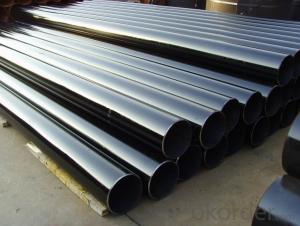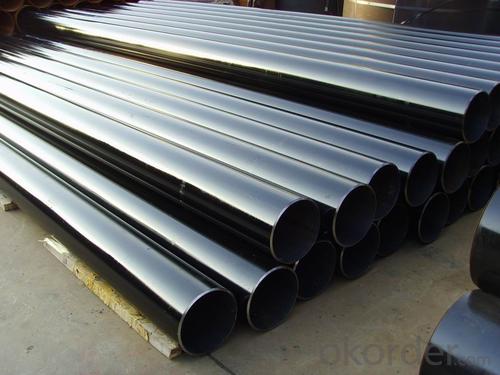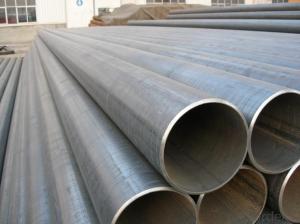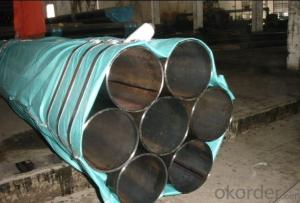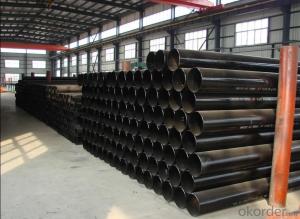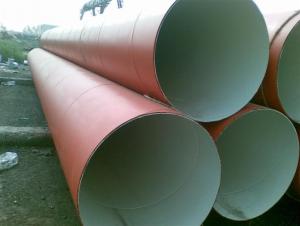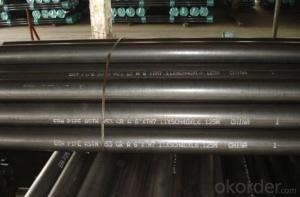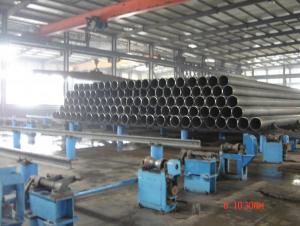API 5L ERW Steel Pipe
- Loading Port:
- China Main Port
- Payment Terms:
- TT or LC
- Min Order Qty:
- 25 m.t.
- Supply Capability:
- -
OKorder Service Pledge
OKorder Financial Service
You Might Also Like
Product Description:
1、Structure of API 5L ERW Steel Pipe Description:
API 5L ERW Steel Pipe is formed by drawing a solid billet over a piercing rod to create the hollow shell.
As the manufacturing process does not include any welding, seamless pipes are perceived to be stronger and more reliable. Historically seamless pipe was regarded as withstanding pressure better than other types, and was often more easily available than welded pipe.
2、Main Features of API 5L ERW Steel Pipe:
• High manufacturing accuracy
• High strength
• Small inertia resistance
• Strong heat dissipation ability
• Good visual effect
• Reasonable price
3、API 5L ERW Steel Pipe Images:
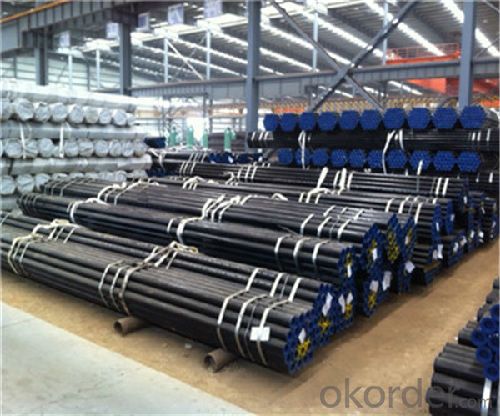
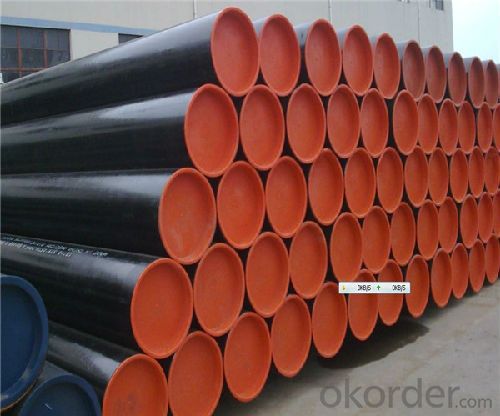
Packaging & Delivery
Packaging Details: | seaworthy package,bundles wrapped with strong steel strip |
Delivery Detail: | 15-30days after received 30%TT |
4、API 5L ERW Steel Pipe Specification:
Standard | GB, DIN, ASTM |
Grade | 10#-45#, 16Mn |
Thickness | 8 - 33 mm |
Section Shape | Round |
Outer Diameter | 133 - 219 mm |
Place of Origin | Shandong, China (Mainland) |
Secondary Or Not | Non-secondary |
Application | Hydraulic Pipe |
Technique | Cold Drawn |
Certification | API |
Surface Treatment | factory state or painted black |
Special Pipe | API Pipe |
Alloy Or Not | Non-alloy |
Length | 5-12M |
Outer Diameter | 21.3-610mm |
Grade | 20#, 45#, Q345, API J55, API K55, API L80, API N80, API P110, A53B |
Standard | ASME, ASTM |
1.Material:20#(ASTM A 106/A53 GRB.API5LGRB,GB),45#,16Mn,10#.
2.Specification range:OD:21.3-610mm,WT:6-70mm,length:6-12m or according to the requirement of clients.
3.Excutive standards:GB,ASME API5L.ASTM A 106/A53,Despite of the above standards,we can also supply seamless steel pipe with standard of DIN,JIS,and so on,and also develop new products according to the requirements of our clients!
4.Surface:black lacquered,varnish coating or galvanized.
5.Ends:Beveled or square cut,plastic capped,painted.
6.Packing:bundles wrapped with strong steel strip,seaworthy packing.
5、FAQ of API 5L ERW Steel Pipe:
①How is the quality of your products?
Our products are manufactured strictly according to national and internaional standard, and we take a test
on every pipe before delivered out. If you want see our quality certifications and all kinds of testing report, please just ask us for it.
Guaranteed: If products’ quality don’t accord to discription as we give or the promise before you place order, we promise 100% refund.
②How about price?
Yes, we are factory and be able to give you lowest price below market one, and we have a policy that “ for saving time and absolutely honest business attitude, we quote as lowest as possible for any customer, and discount can be given according to quantity”,if you like bargain and factory price is not low enough as you think, just don’t waste your time.Please trust the quotation we would give you, it is professional one.
③Why should you chose us?
Chose happens because of quality, then price, We can give you both.Additionally, we can also offer professional products inquiry, products knowledge train(for agents), smooth goods delivery, exellent customer solution proposals.Our service formula: good quality+good price+good service=customer’s trust
SGS test is available, customer inspection before shipping is welcome, third party inspection is no problem.
Any question, pls feel free to contact us !
- Q: How are steel pipes classified based on their schedule?
- Steel pipes are classified based on their schedule, which refers to the thickness of the pipe wall. The schedule classification is denoted by a number, such as 10, 20, 40, 80, etc., with higher numbers indicating thicker walls.
- Q: How do steel pipes withstand pressure?
- Steel pipes withstand pressure due to their inherent strength and resilience. The high tensile strength and durability of steel allow it to withstand the internal pressure exerted by fluids or gases flowing through the pipes. Additionally, the thick walls and cylindrical shape of the steel pipes distribute the pressure evenly, preventing any deformation or rupture. The seamless construction of steel pipes further enhances their ability to withstand pressure, making them a reliable choice for various applications in industries such as oil and gas, plumbing, and construction.
- Q: What is the role of steel pipes in the mining and extraction of minerals?
- Steel pipes play a critical role in the mining and extraction of minerals as they are used for various applications throughout the process. These durable pipes are commonly employed to transport and distribute water, chemicals, and compressed air to different areas of the mine. Additionally, steel pipes are utilized in the construction of mine shafts, tunnels, and underground structures, providing stability and support. Their ability to withstand harsh conditions, resistance to corrosion, and high strength make steel pipes an indispensable component in the mining industry.
- Q: What is the electrical conductivity of steel pipes?
- The electrical conductivity of steel pipes is relatively low, as steel is a poor conductor of electricity.
- Q: How to distinguish between steel pipe and spiral pipe material?
- The alloy tube can be divided into: low alloy pipe, alloy pipe structure, high alloy tube, high strength tube. Bearing tube, heat resistant acid resistant stainless pipe, precision alloy (such as cutting alloy) pipe, high temperature alloy tube, etc..
- Q: Seamless steel tube 89X4 meters, how heavy?
- Generally seamless steel pipe wall thickness will be uneven, according to the theory, each meter is 8.3844 kilograms, but if the wall thickness is poor 20--30 wire, then the weight will increase some
- Q: How are steel pipes used in the construction of bridges?
- Steel pipes are commonly used in the construction of bridges as they provide structural support and stability. They are often used as piers or columns to bear the weight of the bridge deck and transfer the load to the foundation. Additionally, steel pipes are used for the construction of bridge railings and barriers, providing safety for pedestrians and vehicles. Overall, steel pipes offer durability, strength, and flexibility, making them an essential component in bridge construction.
- Q: What are the common uses of steel pipes in construction?
- Due to their durability and strength, steel pipes are widely used in construction for various purposes. Plumbing systems in buildings commonly rely on steel pipes, which can effectively transport water, gas, and other fluids. Their resistance to corrosion and ability to withstand high pressure make them the preferred choice over alternative materials. Steel pipes are also frequently employed for structural support in construction. They serve as columns or beams, providing buildings with structural integrity and stability. With their capacity to support heavy loads, steel pipes are highly favored in the construction industry. Bridges and highways often incorporate steel pipes into their design. They are utilized to create sturdy and long-lasting bridge supports, guardrails, and signposts. The ability of steel pipes to endure extreme weather conditions and heavy traffic makes them a reliable option for infrastructure projects. Additionally, steel pipes are indispensable for underground utilities like sewer and drainage systems. They offer a robust solution for transporting wastewater and preventing leaks. Moreover, they play a crucial role in constructing underground tunnels and pipelines. Furthermore, steel pipes find application in fencing, scaffolding, and handrails in construction. Their strength, versatility, and ability to withstand harsh environmental conditions make them a preferred choice. In summary, steel pipes are vital components in construction due to their numerous advantages. Their durability, strength, and resistance to corrosion make them a reliable choice for various applications in the construction industry.
- Q: What are the common sizes of steel pipe fittings?
- The common sizes of steel pipe fittings can vary depending on the specific application and industry standards. However, there are several standard sizes that are commonly used across different industries. These sizes range from ¼ inch to 48 inches in diameter. Some of the most common sizes include ½ inch, ¾ inch, 1 inch, 1 ¼ inch, 1 ½ inch, 2 inch, 2 ½ inch, 3 inch, 4 inch, 6 inch, 8 inch, 10 inch, 12 inch, 14 inch, 16 inch, 18 inch, 20 inch, 24 inch, 30 inch, 36 inch, 42 inch, and 48 inch. These sizes are often available in various lengths to accommodate different installation requirements. It is important to consult industry standards and specifications to determine the appropriate size of steel pipe fittings for a specific project.
- Q: How are steel pipes used in geothermal energy systems?
- Steel pipes are an essential component in geothermal energy systems as they are used to transport the hot water or steam extracted from the underground reservoirs to the surface. These pipes are designed to withstand high temperatures and pressure, ensuring the safe and efficient transfer of geothermal fluids. Additionally, steel pipes are also utilized in the construction of geothermal power plants, connecting various components like heat exchangers and turbines, facilitating the generation of renewable and sustainable energy.
Send your message to us
API 5L ERW Steel Pipe
- Loading Port:
- China Main Port
- Payment Terms:
- TT or LC
- Min Order Qty:
- 25 m.t.
- Supply Capability:
- -
OKorder Service Pledge
OKorder Financial Service
Similar products
Hot products
Hot Searches
Related keywords
